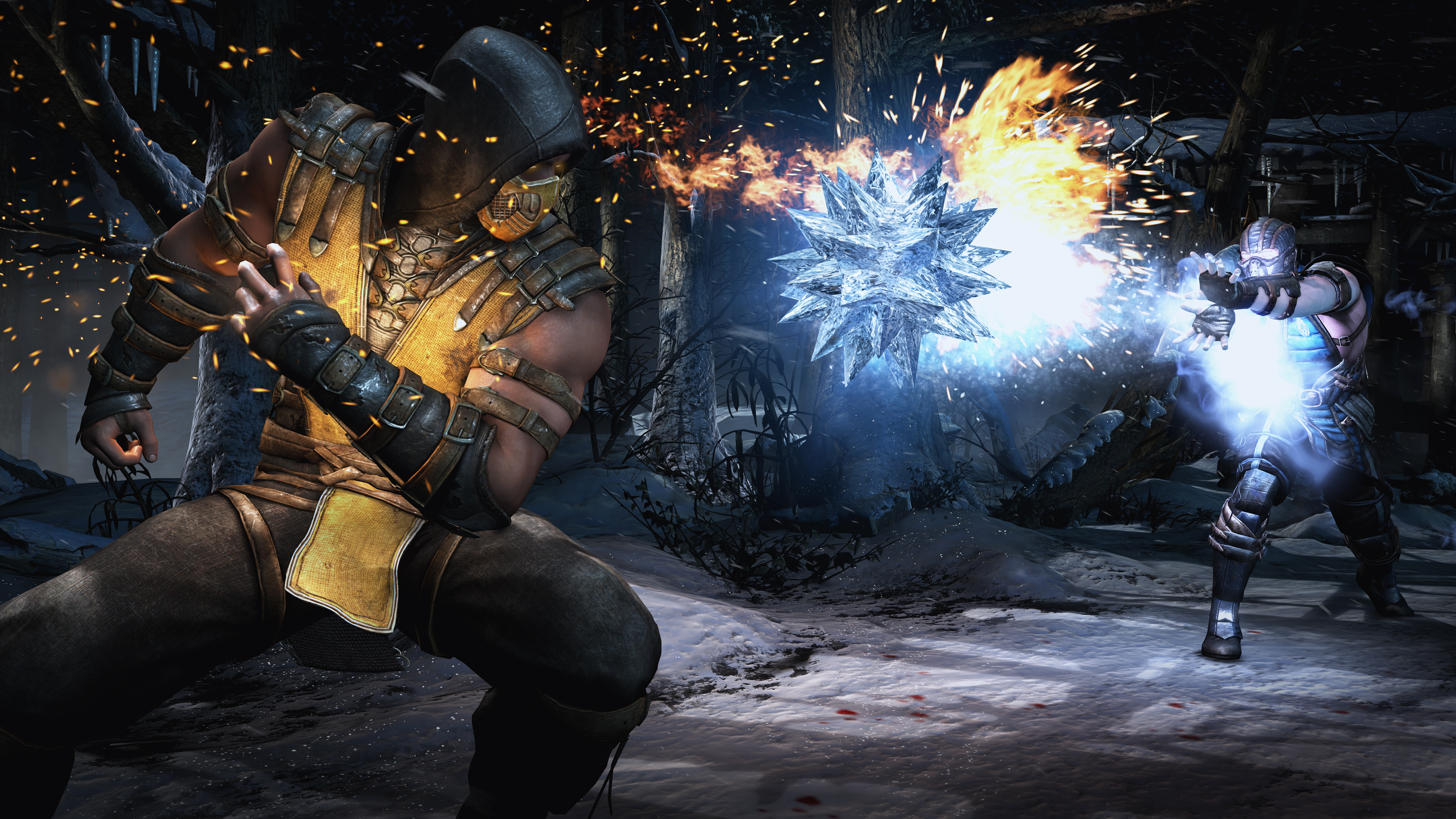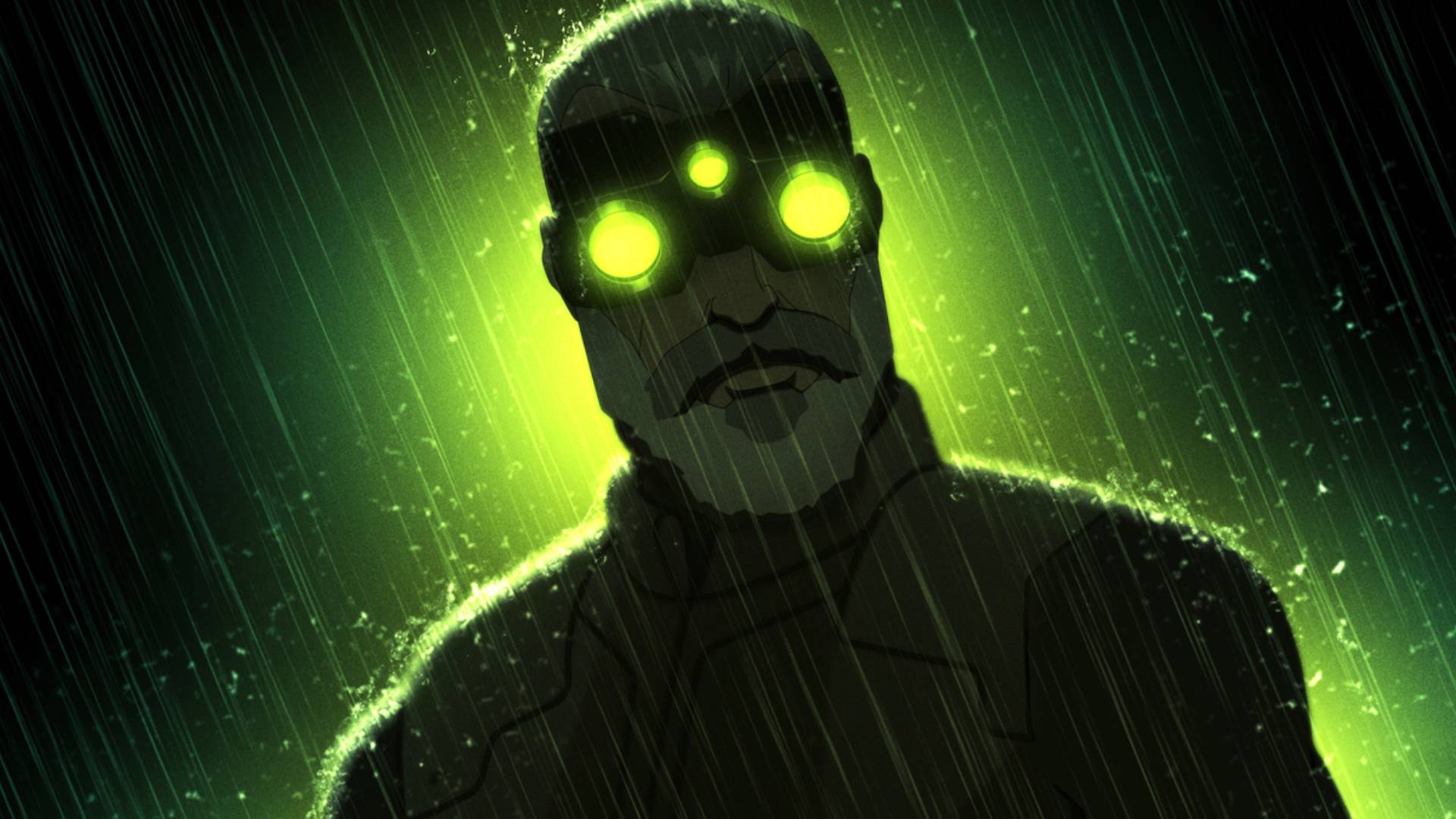GamesRadar+ Verdict
Mortal Kombat X has tons of polish, unique mechanics, and the genre's best story mode, but it doesn't do enough to keep players invested if they weren't already planning on it.
Pros
- +
Variation system adds a ton of depth
- +
Slick presentation and solid
- +
speedy fighting mechanics
- +
Story mode is a blast to play
Cons
- -
Next to no guidance for how to properly play each variation
- -
Sparse single-player content once you've finished the story
Why you can trust GamesRadar+
Mortal Kombat is many things: a gaming industry icon, a fighting genre mainstay, and really, really bloody. There’s so much blood. And entrails. Possibly a spleen. But underneath all the gory excess is a damn good fighting game, one that balances mechanical depth with crowd-pleasing presentation. Though it doesn't always do the best job of preparing you for battle, Mortal Kombat X is enough outrageously violent fun to justify a little self-education, provided you've got enough patience.
If you've taken your lumps in Mortal Kombat 9 or Injustice, MKX will feel familiar: 3D fighters brawl on a 2D plane at a fast, unrelenting pace, with plenty of special moves, flashy combos, and bone-splintering X-Ray attacks being traded back and forth. The somewhat stiff lateral movement and blocking via a button (instead of backing away from your opponent) can initially feel strange if you're typically a Street Fighter person, but any discomfort will fade away after a few matches and some trips to the pause screen, which smartly displays both players' special move inputs right up front.
From there, it's just a matter of picking the fighter that bests suits you, which is a lot more complicated than it sounds. That's all thanks to variations, the most novel idea in MKX and a brilliant addition to the fighting game genre. All of the roster's 24 on-disc characters have three visually distinct variations to choose from before a fight, each one granting unique special moves and enhanced normal attacks on top of your baseline abilities. This effectively gives each fighter three distinct playstyles, and the intricacies and specialized tactics of one may not apply to the other two. It's not enough to know that you love playing as Scorpion: you need to decide if you want him to utilize those dual swords in his combos, focus on fiery attacks from a distance, or be able to summon a demonic minion that'll pester the opponent. That's a lot to take in for a series that's traditionally been a pick-up-and-play affair.
The potential to tailor your favorite character to your preferred playstyle is a double-edged sword, though it's much sharper on the plus side. You'll have to do way more research if you want to know exactly what every fighter's capable of (and how to counter them), but there's also a much greater chance of finding the variation that perfectly suits your personal fighting game tendencies. Once you've got to grips with the concept, this additional layer of depth adds to the variety and strategy before and during each match, without being so overwhelming that it becomes convoluted. Problem is, you're given a single sentence of description for each variation, and figuring out to properly play them is left entirely to you. Prepare to consult some FAQs almost immediately.
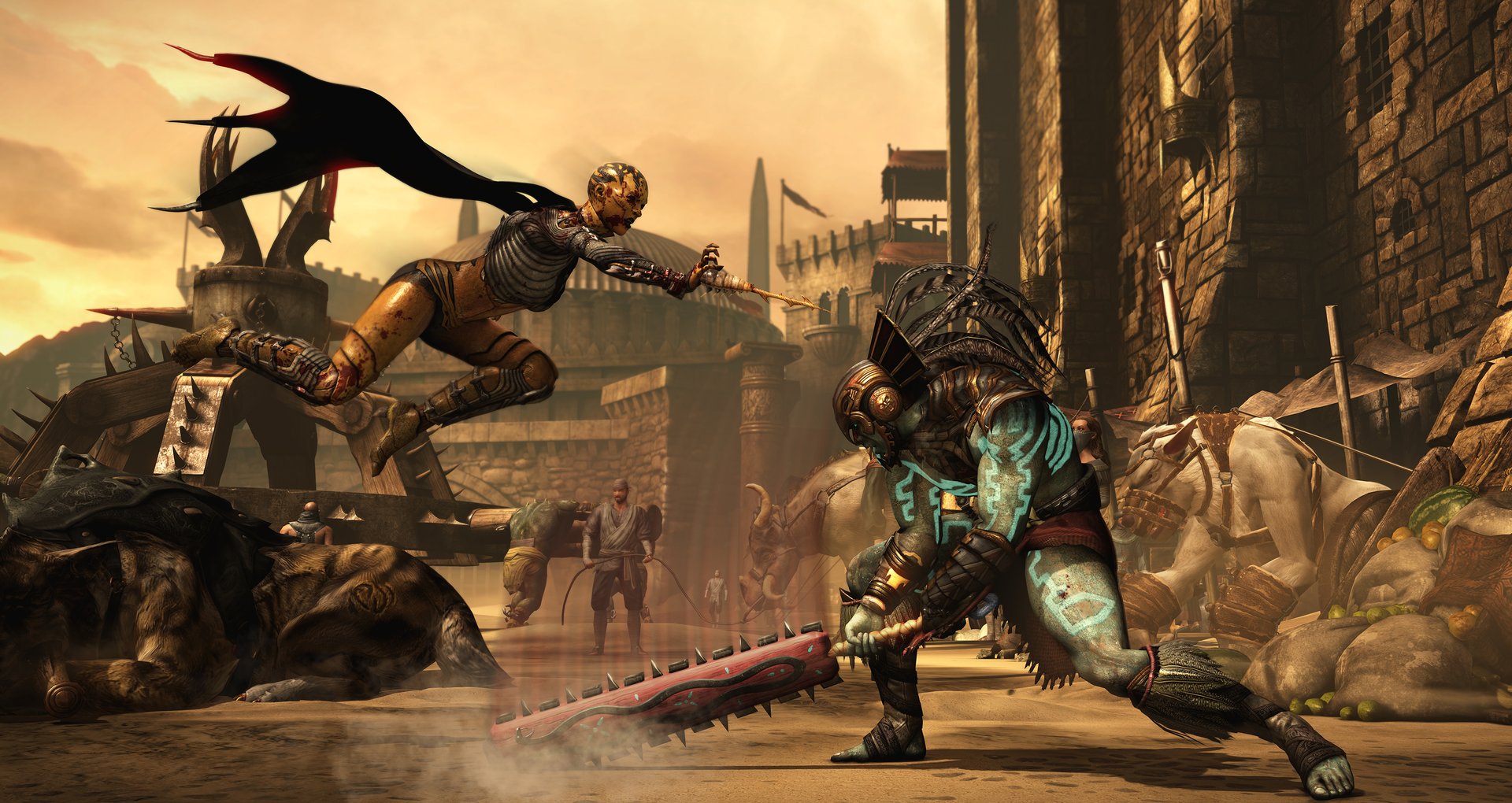

Every MK game squirrels away loads of concept art and secret costumes in the Krypt, but this one's really something special. MKX features a full-blown first-person dungeon to explore for unlockables, which looks almost exactly like the PC RPG Legend of Grimrock. Yes, it still takes way too long to earn everything the Krypt has to offer, and you'll have seen all the unlocks long before you've saved up enough Koins to afford them. But exploring the giant map, collecting iconic MK items to solve simple puzzles, and fending off monsters (which attack you via heart-stopping QTE jump scares) is surprisingly fun, making this new Krypt a minor stroke of genius.
No matter which variation you choose, fights are a nonstop exchange of aggression and intense pressure. If your blocking isn't on point when the opponent gets up in your face with a flurry of mix-ups, the match can end with just a few big combos. Those attack strings feel more freeform than previous MKs, though the dial-a-combo system - where small timing windows for button inputs put an emphasis on committing to guesses - is still a factor. The tempo is more in line with the breakneck speed of Marvel vs. Capcom than the methodical footsies of Street Fighter, and rounds are rarely decided by a Time Over. But the fast pace still delivers the right balance of offense and defense, provided that both fighters are evenly matched. If the combatants aren't of equal skill level, or one player thinks they can get away with simply spamming fireballs from a distance, well... at least the match will be over quickly.
MKX also mixes up the series formula by borrowing the stage interaction system from Injustice. Depending on what's nearby in the backdrop, you'll be able to vault off walls to escape the corner, or fling a poor old lady as a damaging projectile. Unlike Injustice, every fighter uses the environment in the same mildly advantageous way, making them just impactful enough to add excitement to a match without swinging it grossly in someone's favor. The same goes for the slow-mo internal organ destruction of the returning X-Ray attacks, which offer a satisfying comeback factor without being automatic 'I win' barrages.
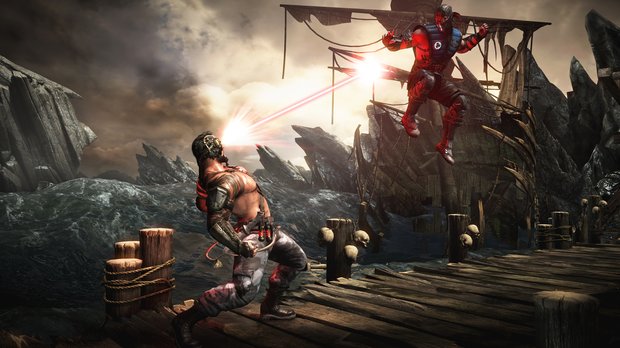
And it wouldn't be an MK game without those shocking, darkly humorous Fatality finishers. They're liable to turn your stomach with how extremely graphic they are, courtesy of MKX's impressively polished visuals (save for some occasionally glitchy lighting and shiny sweat textures that look more like scales than actual perspiration). But what really sells all the hand-to-hand combat and wince-inducing Fatalities are the silky smooth character animations, which look as weighty and authentic as the moves seen in a choreographed kung fu flick.
Weekly digests, tales from the communities you love, and more
You'll get to enjoy plenty of thrilling fight scenes in MKX's story mode, which is just as excellent (and charmingly campy) as MK9's cinematic-heavy single-player campaign. For all its cheesy or over-the-top moments, this epic, chronology-hopping saga is ceaselessly entertaining. You'll laugh when Johnny Cage dishes out an egotistical zinger before a brawl, and you'll pump your fist in excitement when Sub-Zero doles out a frosty beatdown. Even more impressive is how the plot actually makes you care about these characters; unlike the intro/outro clipshows most fighting games have to offer, MKX's story bothers to include things like character development and heartfelt moments in between all the ridiculous action. Every cast member comes to life through great voice-acting and a surprisingly enjoyable script that hits all the right humor and intrigue beats.

All that's a pretty tough act to follow, and once you've wrapped up the five-ish hours it takes to reach the story's end credits, the rest of the single-player content seems boring by comparison. Matches in the Test Your Luck mode - which assigns random, ridiculous effects (like super speed, raining bombs, or electrified floors) to each fight - feel pretty gimmicky and pointless after a couple chaotic rounds. Likewise, ascending the Arcade-style towers gets old fairly quickly. Fun party-friendly modes like MK9's tag team battles are out, though MKX thankfully retains the button-mashing Test Your Might minigame and heaps of extra content to uncover in the Krypt (which has been cleverly redesigned into a bite-sized first-person dungeon crawler).
Luckily, fighting games are best enjoyed against a human opponent, and solo play is secondary if you're able to find a sparring partner. MKX is full of nice touches that cater to competitive-level players, like comprehensive frame data, the option to include diagonals in your move inputs, and button checks (with push-to-set controls) at the character select screen. But there aren't enough guidelines to help bridge the gap between experts and newcomers. The few tutorials are sparse, with almost zero advice on how to properly utilize each variation; there also aren't any trials to teach players which combos should be their bread-and-butter attack strings.
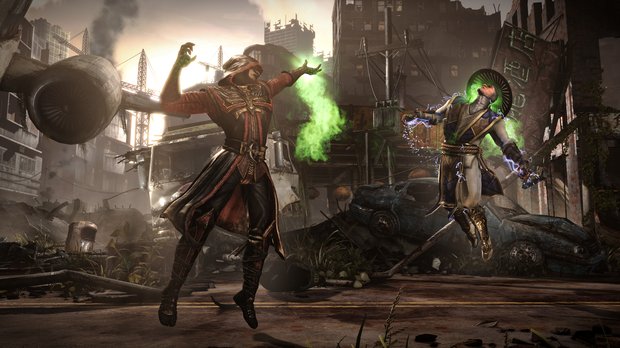
MKX's online component brings some interesting new ideas, but they don't have much payoff. Living Towers offer hourly, daily, and weekly challenges to conquer, but there's not much incentive to bother with them besides taking some DLC fighters for a test drive (a feature that should be in more fighting games). And Faction Wars, where you join up with a global clan to contribute points to a weekly leaderboard, feels a bit too much like guild battles in mobile games: your individual contributions feel like meaningless drops in an Olympic-size pool. Speaking of mobile games, those who abhor microtransactions will recoil in horror at the option to buy consumable tokens for easy Fatalities, though these don't actually affect gameplay in any way. The online matches themselves play smoothly, though matchmaking takes longer than it should, and there's no guarantee that you'll be matched up with someone of equal skill (even in ranked play).
As a whole, Mortal Kombat X is a rock-solid fighting game that owes a lot to the power of its presentation. The story mode is unparalleled in terms of sheer entertainment, but MKX has a way to go in terms of teaching the player how to get the most out of its core systems. Once you've wrapped your head around the many variations and found some actual people to play against, the blisteringly fast back-and-forth matches really start to open up. If you're not willing to make the commitment to seeking out challengers and learning beyond the basics, though, this fighter definitely has a shorter life expectancy.
This game was reviewed on PS4.
More info
| Genre | Fighting |
| Description | The cast of Mortal Kombat is back, this time with even more brutal moves and fatalities than before. |
| Platform | "PS4","PS3","PC","Xbox 360" |
| US censor rating | "Mature","Mature","Mature","Mature" |
| UK censor rating | "","","","" |
| Release date | 1 January 1970 (US), 1 January 1970 (UK) |

Lucas Sullivan is the former US Managing Editor of GamesRadar+. Lucas spent seven years working for GR, starting as an Associate Editor in 2012 before climbing the ranks. He left us in 2019 to pursue a career path on the other side of the fence, joining 2K Games as a Global Content Manager. Lucas doesn't get to write about games like Borderlands and Mafia anymore, but he does get to help make and market them.
